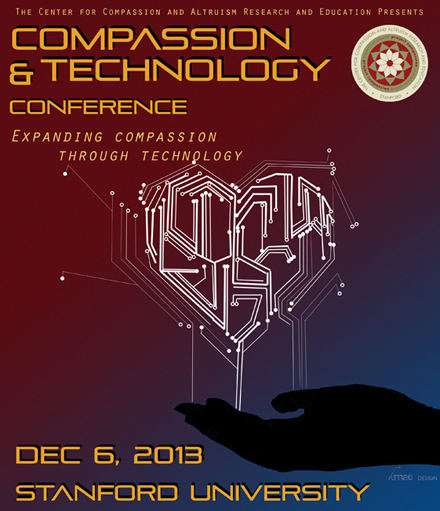On December 6, 2013, Stanford University’s Center for Compassion and Altruism Research and Education (CCARE) is holding the inaugural Compassion and Technology Conference at the Stanford Medical School in Palo Alto, California. Scientists, engineers, social entrepreneurs, and compassionate people will converge at Stanford University for discussions and presentations on the cutting edge of compassion. Plus there is a contest to design technology to enhance compassion. The conference is a collaboration with CCARE, Facebook, 1440 Foundation, HopeLab, and The Dalai Lama Foundation.

The conference’s purpose is to support a dialogue around innovative practices on compassion and technology. Expert researchers and technology leaders who have successfully implemented and fostered compassionate action through the use of technological advancements will present talks on compassion. Conference attendees will learn how compassion can be trained using technological education tools, tracked geographically through mapping tools, used to inspire, and implemented as an intervention in communities where it is most needed (e.g., war zones, prisons, at-risk schools, trauma populations, and healthcare systems).
Compassion is defined as the emotional response to perceiving suffering and involves an authentic desire to help. It is a virtue that is promoted across cultures and religions. A growing body of evidence suggests that compassion is a natural and automatic response that has ensured our survival and that has benefits for psychological and physical health as well as longevity and flourishing.
“While compassion is a fundamental part of every religious tradition, there is an ever enlarging body of scientific evidence that technological advancements have an immense positive impact in terms of increasing compassion and altruistic behavior on both the community level and the individual level. This conference will highlight these aspects from a technological aspect as well as a scientific aspect in an effort to promote awareness and progress, and reward those who are working towards these goals. We at CCARE are very excited to initiate and sponsor the conference and contribute to this expanding field,” says Dr. James Doty, Founder and Director of CCARE.
Preceding the conference on Dec. 5 at Facebook Headquarters will be Facebook’s Compassion Research Day, a bi-annual event about the ways in which Facebook encourages compassionate interactions on its social media platform. Facebook engineers and collaborative research scientists including CCARE’s Associate Director, Emma Seppala, will be presenting.
Compassion and Technology Contest
The Compassion and Technology Contest calls for innovators, engineers, and designers to present a technology design or product that will help people learn, practice, or improve qualities of compassion, empathy, social connectedness, or altruism. Some examples of compassionate technology are a website using knowledge from compassion science to help “build compassion muscles”, compassion education apps, and compassion-inducing video games. The deadline for entries was Oct. 21st. The top finalists will present their ideas at the Compassion and Technology Conference before the audience and a panel of technology expert judges, who will pick the winners.
Three winning finalists will be selected to receive an award (one $10,000 award and two $5,000 awards), an hour consultation with the operating partner of the growth capital fund The Bridge Builders Collaborative, and the opportunity to meet His Holiness the 14th Dalai Lama when he visits the Bay Area on February 24, 2014.
The technologies will be judged on whether they:
- Help people learn, practice, improve, and share one or more of the following qualities: compassion, empathy, social connectedness, altruism.
- Use technology (broadly defined as tools, apps, social media, etc.) to effectively reach a wide audience and increase the scalability of the idea.
- Apply to one or more of the following areas: learning, practicing, increasing, and spreading compassion.
- Are easy to use, so that people without technology expertise can easily access and use it.
- Are scalable, sustainable, and financially viable.

